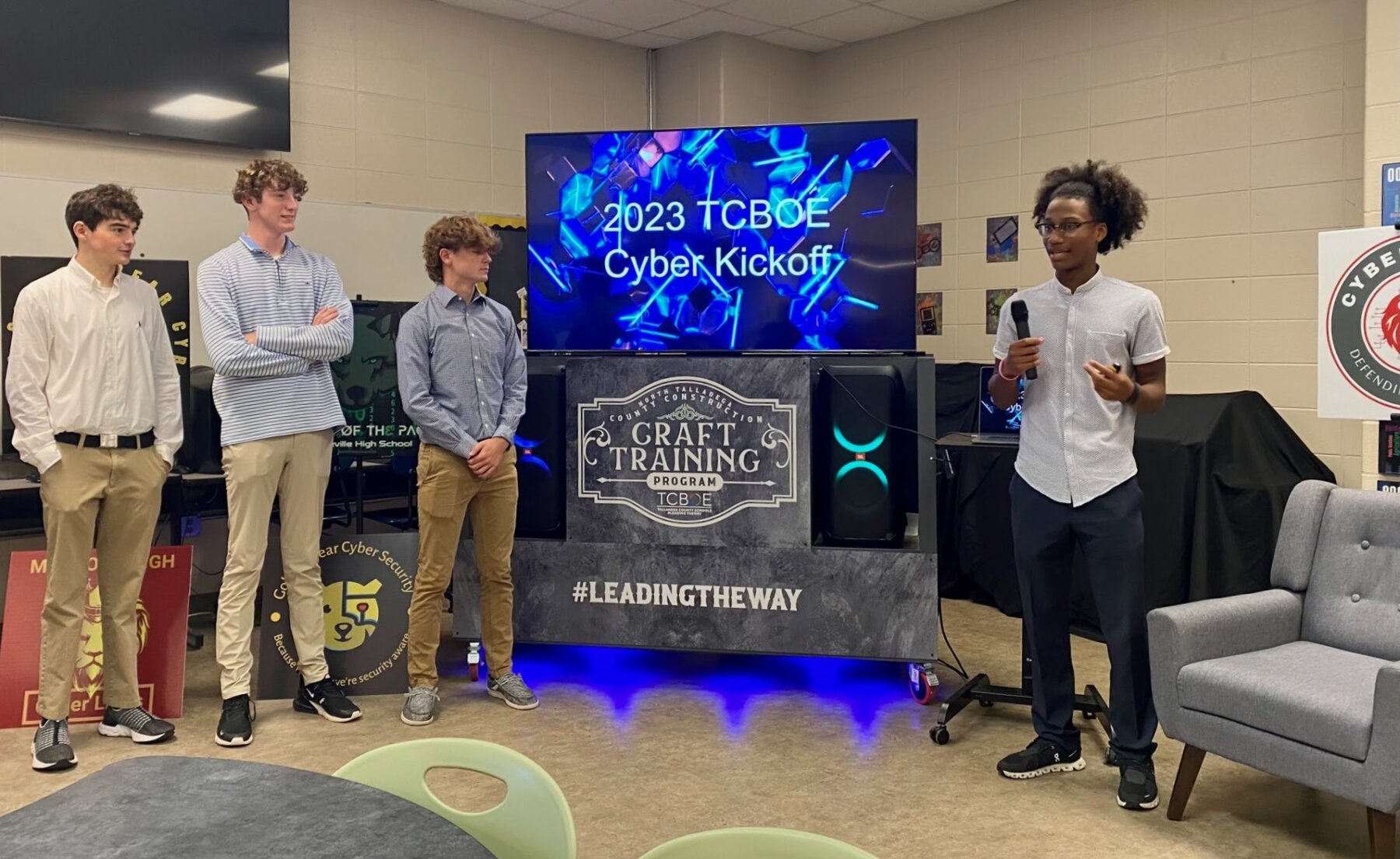These Rural Alabama Teens Are Training for Cybersecurity Jobs

Kyrie Frith, 17, grew up watching digital forensics experts on her favorite shows “Law & Order” and “Bones.” “I was always fascinated by how cybersecurity could help with finding the criminal,” she said.
Last year, she was placed in an introductory cybersecurity class at Lincoln High School in Lincoln, Alabama. She learned how to take on encryption challenges and joined an all-girls cybersecurity team at a statewide competition in Huntsville. They ended up scoring more points than the adult and college teams. “I never thought of myself as a techie person,” Frith said. “But I realized you can use your creativity to work through so many different ciphers.”
There are an estimated 8,000 unfilled cybersecurity jobs in Alabama and 750,000 cybersecurity job vacancies across the country. To address the growing talent gap, Talladega County Schools has launched cybersecurity courses with the support of technology education nonprofit Digital Promise for high schoolers to pursue cyber and network security careers. The Alabama school district, which serves mostly rural students, is providing a direct pathway for students to graduate into entry-level cybersecurity positions or pursue additional studies in college.
Now in its second year, the program has taught over 200 high schoolers about cyber problem-solving, data analysis and incident response. “We are a rural district with a high poverty rate,” said Brooke Morgan, coordinator of innovative learning at the school district. “This cyber track will make sure that all our students receive equitable education and career opportunities.”
Starting with cybersecurity basics
Brian Kelly had been teaching information technology at Lincoln High School for years when he was approached to recruit students for an introductory cybersecurity class through the school district and Digital Promise’s partnership.

During the first few classes, he told them to imagine all the different ways they could break into a physical house. Soon, they graduated to virtual simulations of breaking into their own school’s technology systems. “We call it ‘thinking like an adversary,’” Kelly said.
With the rise in cybersecurity attacks like phishing, malware and ransomware, demand for cybersecurity experts has increased nationwide. The number of cybersecurity job positions is expected to grow 33% by 2033, and recent developments in artificial intelligence have only added to the urgent need for professionals who can protect against AI-generated cyberattacks.
Ira Lacy, a network security engineer and cybersecurity expert who helped launch the state’s first cybersecurity curriculum, said it’s important to center ethics in educating digital-savvy students. “These kids grow up extremely online, and then we teach them all these additional technical skills,” he said. “Imagine the harm they could cause. We make sure they know they have a responsibility to grow their skills and use them to take care of others.”
He has witnessed how teaching students about cybersecurity at a young age has given them a head start in competitive cybersecurity jobs, like information security analysts and IT auditors. “If you can teach kids early on with a multiyear curriculum, then they can walk away with up to six certifications coming out of high school,” he said. “Those same students that I started with in 2014 are now in their early 20s, and they’re leading teams at companies.”
Seth Walker, a senior at Lincoln High School, is in his second year of the cyber curriculum. He’s learning more advanced programming that protects against cyberattacks on banks, hospitals and schools. “If I hadn’t taken the first class last year, I don’t think I would have pursued cybersecurity at all,” he said.
After he graduates, he’ll start his cybersecurity degree at Troy University. “My dream job is to become a cyber auditor who ensures companies have the correct security protocols,” Walker said.
Encouraging girls to train for cybersecurity jobs

Keeping in mind the gender imbalance in the cybersecurity workforce, the program has made an effort to recruit girls by increasing the understanding that cybersecurity threats are personal and approachable. “Because it’s about connecting and protecting each other, it doesn’t have to feel like just another technology course for them,” said Kimberly Smith, the chief innovation officer at Digital Promise.
Kelly’s biggest challenge was explaining to his students that they didn’t need to be expert programmers to prepare for cybersecurity jobs. “There’s like a misconception from the way the movies portray the hacker with the hoodie on, drinking the Mountain Dew,” he said. “It adds to the assumption that only certain people are going to be good at learning about cyber.”
Frith felt empowered after her initial experience on the all-girls team, convincing four of her friends to join her in future competitions. “At first, I felt like an outcast, but I’ve gotten more people interested in taking the class with me,” she said.
She plans on getting a certificate in digital forensics to work in criminal justice, just like she saw on “Law & Order.” “I’ve always loved those shows, and now I can get paid to do something that I enjoy because I learned about cybersecurity at school,” Frith said.



